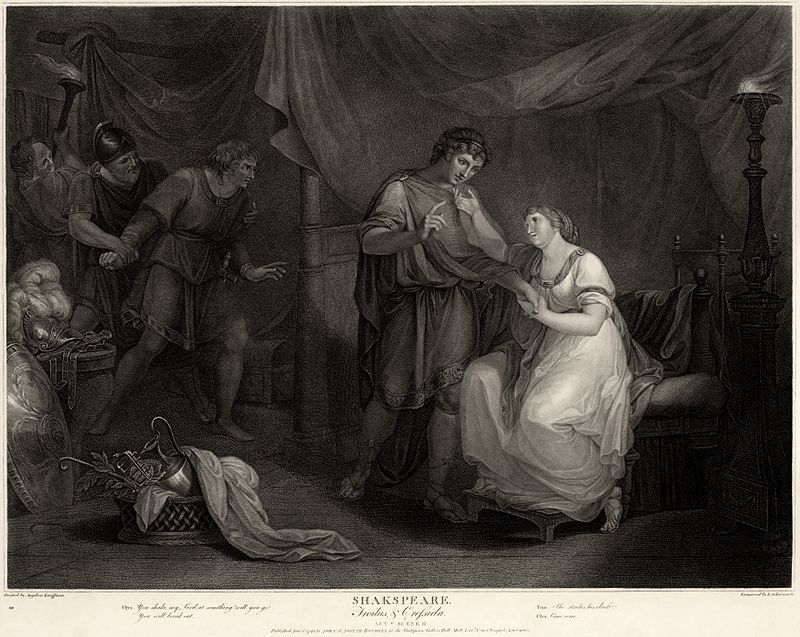Troilus and Cressida
Troilus and Cressida is a tragedy by William Shakespeare, believed to have been written in 1602. It was described by Frederick S. Boas as one of Shakespeare's problem plays. The play ends on a very bleak note with the death of the noble Trojan Hector and destruction of the love between Troilus and Cressida. The work has in recent years "stimulated exceptionally lively critical debate"
Throughout the play, the tone lurches wildly between bawdy comedy and tragic gloom, and readers and theatre-goers have frequently found it difficult to understand how one is meant to respond to the characters. However, several characteristic elements of the play (the most notable being its constant questioning of intrinsic values such as hierarchy, honour and love) have often been viewed as distinctly "modern", as in the following remarks on the play by author and literary scholar Joyce Carol Oates:
Troilus and Cressida, that most vexing and ambiguous of Shakespeare's plays, strikes the modern reader as a contemporary document – its investigation of numerous infidelities, its criticism of tragic pretensions, above all, its implicit debate between what is essential in human life and what is only existential are themes of the twentieth century. ... This is tragedy of a special sort – the "tragedy" the basis of which is the impossibility of conventional tragedy.

Date and text
The play is believed to have been written around 1602, shortly after the completion of Hamlet. It was published in quarto in two separate editions, both in 1609. It is not known whether the play was ever performed in its own time, because the two editions contradict each other: One announces on the title page that the play had been recently performed on stage; the other claims in a preface that it is a new play that has never been staged.
The play was entered into the Register of the Stationers Company on 7 February 1603, by the bookseller and printer James Roberts, with a mention that the play was acted by the Lord Chamberlain's Men, Shakespeare's company. No publication followed, however, until 1609; the stationers Richard Bonian and Henry Walley re-registered the play on 28 January 1609, and later that year issued the first quarto, but in two "states". The first says the play was "acted by the King's Majesty's servants at the Globe"; the second version omits the mention of the Globe Theatre, and prefaces the play with a long epistle that claims that Troilus and Cressida is "a new play, never staled with the stage, never clapper-clawed with the palms of the vulgar".
Some commentators (like Georg Brandes, the Danish Shakespeare scholar of the late 19th century) have attempted to reconcile these contradictory claims by arguing that the play was composed originally around 1600–1602, but heavily revised shortly before its 1609 printing. The play is noteworthy for its bitter and caustic nature, similar to the works that Shakespeare was writing in the 1605–1608 period, King Lear, Coriolanus, and Timon of Athens. In this view, the original version of the play was a more positive romantic comedy of the type Shakespeare wrote ca. 1600, like As You Like It and Twelfth Night, while the later revision injected the darker material – leaving the result a hybrid jumble of tones and intents.
The Quarto edition labels it a history play with the title The Famous Historie of Troylus and Cresseid, but the First Folio classed it with the tragedies, under the title The Tragedie of Troylus and Cressida. The confusion is compounded by the fact that in the original pressing of the First Folio, the play's pages are unnumbered, the title is not included in the Table of Contents, and it appears to have been squeezed between the histories and the tragedies. Based on this evidence, scholars believe it was a very late addition to the Folio, and therefore may have been added wherever there was room.












0 comments
Sign in or create a free account